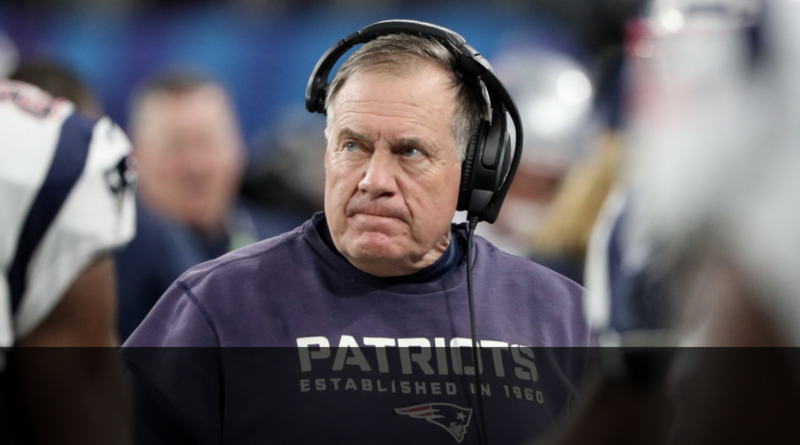Alan Truex: Patriots’ defense is no longer Super, as Belichick loses his touch

The Super Bowl collapse of the New England Patriots’ defense was unprecedented: 41 points, 538 yards allowed and five touchdowns, including one on a reception by the opponent’s backup quarterback. The head coach, Bill Belichick, said little besides, “It’s on me,” and much of Patriot Nation agreed.
It’s on him for benching his starting right cornerback, Malcolm Butler, who this season led the team by playing 97.8% of the snaps on defense and forcing three fumbles. It was his game-ending interception that won the Super Bowl against Seattle three years ago.
It’s on Belichick that Butler’s replacement, Eric Rowe, was picked on like Willie Nelson’s guitar.
It’s on Belichick that Butler was never used as the nickel corner, which had been Rowe’s position.
Instead, Johnson Bademosi filled the slot and chased Nelson Agholor, and the less said about that the better. Bademosi’s performance might have been less calamitous had he known a few days ahead of time – instead of a few minutes – what his role would be. More film study of Agholor could not have hurt.
It’s on Belichick that his team’s chemistry blew up when he revealed his fateful decision as the game was about to kick off. NBC cameras showed the stunned Butler sobbing and wiping his eyes during the national anthem.
Brandon Browner, who started in New England’s Super Bowl game against Seattle, posted an Instagram defending his fellow cornerback and blaming the hooded coach for “a locker room divided pre-game” and a game plan in which “your best defender for the past 3 seasons doesn’t get a snap.”
Way to fire up your team before its biggest game of the season. With a sixth Lombardi Trophy in the offing, what a time for the head coach to create a distraction.
The fact that the retired Browner considers Belichick heavy-handed is not very newsworthy. But it is significant that the Pats’ star linebacker, Dont’a Hightower, “liked” Browner’s Instagram, thus endorsing his view of encroaching dissension as well as Butler’s assertion that “I could have changed that game.”
Belichick’s notorious reticence led to media speculation that Butler was demoted to special teams (for a total of one play) because he missed some Super Bowl preparation with flu and did not distinguish himself when he did practice.
Butler, 27, will depart in free agency in this off-season, thus continuing the decline of the Patriot defense that began in March 2016. That’s when Belichick traded edge rusher Chandler Jones to Arizona for a fringe-starting guard, Jonathan Cooper, and a second-day draft pick that turned out to be a fringe-starting guard, Joe Thuney.
Jones in 2015 led New England with 12½ sacks (6 more than this year’s leader, Trey Flowers). But his days in Foxborough became numbered when Jones was hospitalized overnight for the effects of synthetic legal marijuana.
Browner suggested that weed had something to do with Butler’s punishment, along with a curfew violation. There was also a history of tardiness. Whatever, there’s been no allegation of anything that justified such an extreme measure against not only Butler but every one of his teammates.
As for Jones, he led the NFL in sacks this season with 17 – terrific feat wasted in the desert. He might have turned the Super Bowl around by sacking Nick Foles, which the Patriots failed to do even once.
As New England linebacker Kyle Van Noy put it, “Defense just didn’t come to play.”
Who knows for what reasons?
Perhaps the bearded, burly coordinator, Matt Patricia, spent too much time plotting his upcoming moves as Detroit Lions head coach instead of concocting an effective defense against Nick Foles and Zach Ertz.
The concussion suffered by safety Patrick Chung in the third quarter was a severe blow to New England. Time to call on Butler? There had to be a place for him somewhere in those smoldering ruins of a secondary. After all, he broke up 12 passes this season – 9 more than Rowe and Bademosi combined.
There was more bad news after the game, though it did not involve the shattered defense. Tight end Rob Gronkowski, widely acclaimed as the NFL’s finest player, indicated he was pondering retirement at 28.
“I’m going to sit down in the next couple of weeks and see where I’m at,” he said, after catching 9 passes for 116 yards.
Gronk has accumulated a career’s worth of injuries: three back surgeries, two torn knee ligaments, two concussions, forearm fractured three times, a perforated lung, sprained ankle, strained hamstrings.
He doesn’t need the money, thanks to his $9 million salary plus endorsement revenues approaching $1 million annually. And he’s known for frugality, excepting on occasion his bar tabs.
It may be that Super Bowl 52 will mark a crossroads, where the New England dynasty ends and Philadelphia’s begins.
Doug Pederson turned 50 last week. He’s coaching one of the league’s youngest rosters, led by 25-year-old Carson Wentz, who was on his way to being regular-season MVP before he was injured and replaced by Foles, 29, who became Super Bowl MVP. This team was brilliantly constructed, mostly by general manager Howie Roseman, who’s 42.
Pederson on Sunday night was more engaged and inventive than Belichick, who actually did beat him to the punch on the QB reception novelty.
But Tom Brady, he of the lacerated right thumb, dropped the pass when jogging 10 yards clear of a defense that was napping, as it was a few other times during a game that resembled Arena football. When Foles got his opportunity, he caught a fourth-down throw to the end zone.
Creatures of habit, as are we all, Las Vegas bookmakers have installed New England as the favorite to win the next Super Bowl. But with Belichick being 65, Brady 40, Gronk aging prematurely, and tensions rising in the locker room, this is looking like a dynasty whose time may have passed.
